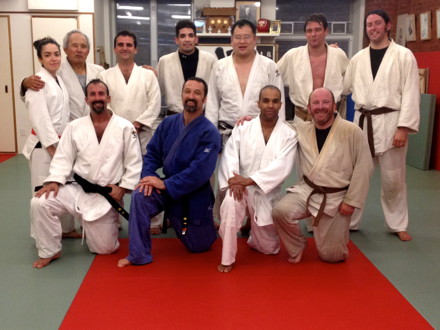Wojdan Shaherkani – follow-up
Saturday, August 4th, 2012A few notes following up on my post about Wojdan Shaherkani.
The universality clause
There's a special rule that made it possible for Shaherkani and the other Saudi woman, a runner named Sarah Attar, to compete:
A second International Olympic Committee spokeswoman, who declined to give her name, said both Saudi athletes were accepted under the Olympics’ “universality†clause. It allows athletes who didn’t meet qualifying times to compete when their participation is deemed important for reasons of equality.
The clause was invoked most memorably for Eric “the Eel†Moussambani, a swimmer from Equatorial Guinea, in the 2000 Olympics.
Attar's first Olympic race will be on Wednesday, August 8.
Double elimination
I notice Shaherkani did not fight again. No reason has been given that I know of, nor does there need to be as far as I'm concerned. [Update: A correction from Yonah: "The olympics are not double-elimination, they are modified single elimination. Only those that make it to the round of 8 are given a shot at a medal. Of the last 8, the first 4 to lose can only win bronze."]
Head covering
I can't imagine the head covering that Shaherkani wore will work as a long-term solution. It would surely come off in any serious matwork. I've seen matches where one player had a bandaged head, but if that bandage came off it was "only" an injury being aggravated, not a strict religious rule being violated.
Maybe someone could design a head covering similar to the headgear wrestlers wear to protect their ears? Could it be adjusted to allow for legitimate attempts at choking without injuring the opponent? What about sports hijabs like this and this — could they be modified to work for grapplers?
I thought it odd that fear of choking was one initial objection to allowing headscarves in judo:
judo officials claimed a headscarf could cause choking, in a sport that involves grabbing and throwing.
I'd imagine the more serious issue would be an adjustment to the rules so that the headwear may not be used to inflict a choke, as one may do with parts of one's own or the opponent's uniform.
Kindness
I disagree with this description at WSJ.com:
Before the fight, some other judo fighters worried that Shaherkani wasn't qualified to compete and suggested it could be dangerous for her to square off against Olympic athletes in the violent sport.
Those concerns faded quickly when the bout got under way. Shaherkani used a defensive strategy, trying to deflect Mojica's advances. She succeeded a few times before Mojica grabbed hold of her and swung her to the ground.
That's not how I saw it at all. I didn't see a "defensive strategy" succeeding a few times. I saw Mojica being extremely kind to an awkward and terrified teenager. Mojica was gentle with gripfighting and gentle with the throw, just as any experienced player with a shred of decency would treat a beginner in the dojo. Maybe I'm imagining this, but to me she made a point of finishing the match without hurting or humiliating her opponent. I was touched by that, and by her respectful bow as she shook Shaherkani's hand.
